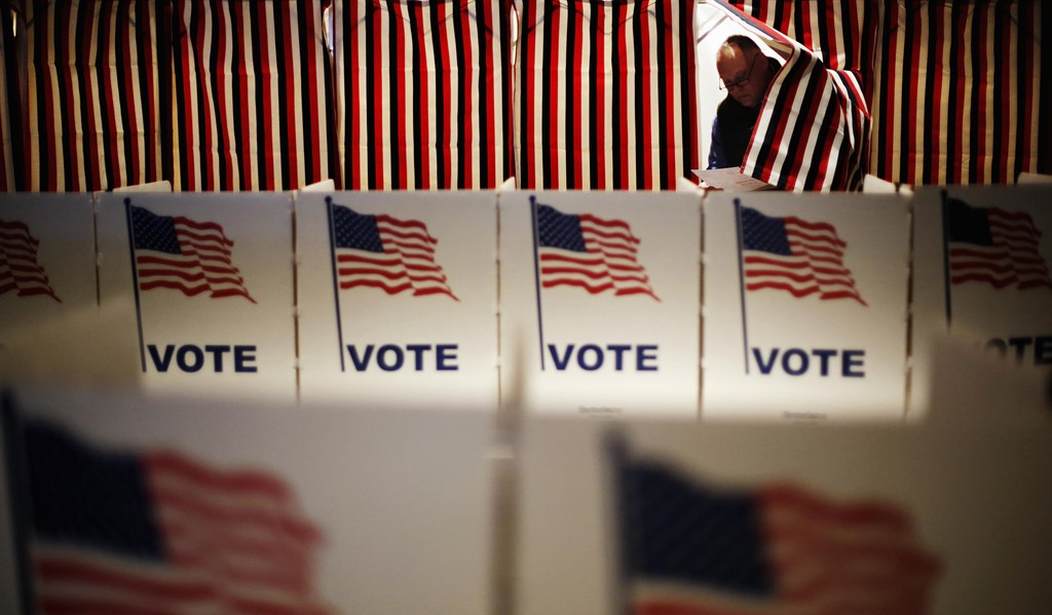Last week was consequential for Greg Gianforte. Awfully.
On the bright side, the Republican businessman won the special election for Montana’s lone seat in the U.S. House of Representatives. But Gianforte also body-slammed a reporter, apparently. He now faces misdemeanor assault charges.
For which he apologized publicly . . . as he was declaring victory.
National Democrats declared victory as well. As the Washington Post reported before the votes were counted, “Democrats prepared to claim victory no matter the outcome.” I guess they can relish having Gianforte in Congress to provide Republicans yet more embarrassment.
Still, let’s body-slam the silly and simplistic spin that losing yet another special election is a harbinger of growing Democratic Party strength. “Republicans’ 7-point win in last night’s Montana election is great news for Democrats,” the progressive Vox headlined Matthew Yglesias’s story.
“If Republicans are winning in places like Montana by just 7 percentage points, then they are in extreme peril of losing their House majority in November 2018,” predicted Yglesias. His advice? “Republican leaders have taken their party on a risky course, and they ought to strongly consider turning the ship around.”
It’s not that I wouldn’t suggest different steering, were I advising the GOP. But it wouldn’t be to Yglesias’s preferred destination. And let’s first examine what the numbers in Montana really mean.
Harry Enton at FiveThirtyEight blog, like most mainstream media reporters, pundits and experts, points to Gianforte’s margin of victory coming in well below President Trump’s margin last November. True enough, Gianforte won by six percentage points last week, while Trump beat Hillary Clinton by 20 points last November. Thus, the GOP has fallen 13 points from last year — or so the thinking goes.
Recommended
But the comparison is faulty. Gianforte was also on the statewide ballot last November, along with Trump. Gianforte lost the race for governor to Democrat Steve Bullock, 50 to 46 percent. So, his Trump-deficit last November was even larger — not a mere 13 points, but 24.
In fact, Gianforte improved his showing from November — even with the last-minute criminal assault charge. How is that a sign of the GOP generically losing support?
The truth is that in last year’s presidential election Hillary Clinton badly underperformed for a Democrat in Montana, garnering a pathetic 35.4 percent of the statewide vote against Trump’s 55.6 percent. Had Gianforte faced Hillary Clinton last November or last week, rather than a Big Sky Country Democrat, he might have defeated her by 20 percent of the vote, too.
Other analysts skip the race-by-race analysis and identify Montana as a solidly red state, where Republicans have a sizable advantage. While the state clearly does lean GOP, it is hardly dominated by the party. One or both of Montana’s two U.S. Senators have been Democrats since 1913.
In looking ahead to next year’s midterm elections, Republicans have plenty of reason to worry about energized Democrats — and, moreover, about a conservative base completely depressed over the party’s failures in Washington. But that is decidedly not the message coming last week from Montana.
What is the message?
There are several, actually. Certainly one clear message is that the electoral process is broken. One can blame voters for the politicians who get elected, sure. But when the major parties regularly nominate candidates reviled by most citizens, and rules make it nearly impossible for alternative candidates to get a fair shot at being in debates and gaining exposure, what is a voter to do?
Last year’s presidential contest pitted two thoroughly unpopular candidates against each other, providing voters with a choice between bad and worse. The winner of the Montana special election wasn’t necessarily the person Montanans wanted to represent them in Congress, but the lesser of evils.
There are numerous reforms that would help: end unfair barriers to ballot access (and access to public debates) for independent and minor party candidates; use Ranked Choice Voting, which encourages a more civil political discussion; and even term limits, which, at the very least, limit how long any one jerk can be in office.
There were also troubling messages sent about civility, partisanship and the place of the media in our political process.
Some questioned whether the violent incident was even a negative for Gianforte, who raised $100,000 the following day. When, in his victory speech, Gianforte apologized for assaulting reporter Ben Jacobs with The Guardian, stating, “I made a mistake,” one person in the election night crowd yelled, “Not in our minds!”
Physically attacking a reporter is 110 percent wrong. Nonetheless, the response of many that the journalist may have “had it coming” stems from a growing hostility Republicans feel toward the media. Yet, that animus is not altogether unearned — especially in the age of Trump, when some in the media urge journalists to “oppose” the president.
“If you check the party affiliation of someone who commits assaults before deciding how you feel about it,” tweeted pollster Frank Luntz, “you’re what’s wrong with America.”
Luntz is right. Partisanship means always having to hold your nose for your own slime-ball.
Perhaps the most obvious message from the Montana election is that early voting periods have gotten far too long and are problematic. Montana’s early voting began nearly four weeks before Election Day. When the assault occurred, it did not matter as much because most Montanans had already cast their ballot.
It is critical that we vote all together, with essentially the same information before us. Make Election Day a three or five-day period, where it’s easy enough for those who care to vote to do so, but not a nearly month-long process, whereby a candidate can have already banked the majority of votes before the campaign is over.

























Join the conversation as a VIP Member